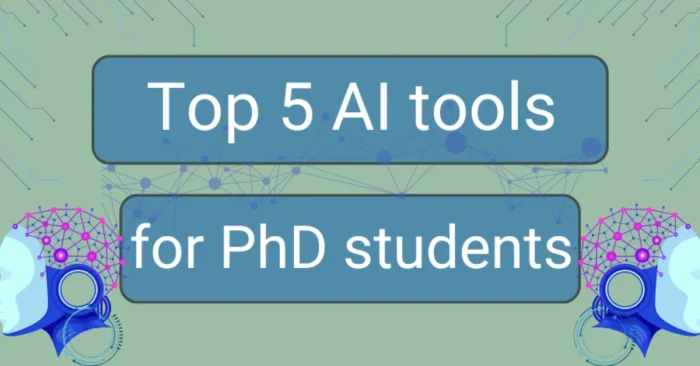Overview
AI tools for PhD students provide powerful support in research, writing, data analysis, and project management. These tools simplify complex tasks like literature reviews, citation management, and statistical modeling. AI writing assistants help refine academic papers, while data analysis platforms process large datasets efficiently. Tools for plagiarism detection, reference formatting, and idea generation save time and ensure academic integrity. PhD students can also use AI for project scheduling, note summarization, and even creating visual presentations. By automating repetitive tasks, AI allows researchers to focus on innovation and critical thinking, ensuring higher productivity and better research outcomes.
1. AI in Literature Review
AI tools scan thousands of academic articles quickly to identify relevant studies. They summarize findings, highlight key insights, and suggest research gaps. This helps PhD students save time during the early research phase and focus on analyzing meaningful data instead of spending weeks searching for sources.
2. AI for Academic Writing
AI-powered writing assistants improve grammar, clarity, and structure in research papers. They suggest better word choices, organize paragraphs, and maintain academic tone. This ensures that dissertations and journal submissions meet high-quality standards, reducing the chances of rejection and improving readability for global audiences.
3. AI in Plagiarism Detection
AI-based plagiarism checkers compare research documents against billions of online sources and academic databases. They highlight unoriginal text and suggest proper citations. This helps students maintain originality and academic integrity while ensuring their work adheres to ethical publishing practices and university guidelines.
4. AI for Citation Management
AI citation tools generate references in styles like APA, MLA, or Chicago within seconds. They extract details from research papers and automatically format bibliographies. This saves PhD students from manual errors and ensures accurate referencing throughout their thesis or journal publications.
5. AI in Data Analysis
AI-powered platforms process large datasets quickly and identify patterns that might be missed manually. These tools help in statistical modeling, predictive analysis, and hypothesis testing. By automating data analysis, PhD students can focus on interpreting results and advancing their research findings.
6. AI for Language Translation
PhD students working with international research often face language barriers. AI translation tools convert academic articles, surveys, and resources into multiple languages accurately. This broadens access to global knowledge and allows students to incorporate diverse perspectives into their research projects effectively.
7. AI in Time & Project Management
AI productivity tools schedule tasks, set deadlines, and send reminders for research milestones. They analyze workload and optimize daily routines, ensuring PhD students stay on track with dissertation goals. Effective time management with AI reduces stress and enhances research productivity.
8. AI for Note Summarization
AI note-taking tools summarize long lectures, research papers, and recorded seminars into concise notes. This allows PhD students to grasp essential information quickly without missing key details. Summarization tools also organize notes by topic, making future references faster and easier.
9. AI in Presentation Design
AI-powered design tools create academic presentations, posters, and infographics. They generate visually appealing slides, charts, and data visualizations that communicate research findings clearly. With AI support, PhD students can present complex data in an engaging and professional way at conferences or seminars.
10. AI for Research Idea Generation
AI platforms analyze existing studies and suggest new research topics or unexplored gaps. By processing massive amounts of published work, these tools inspire fresh research directions. PhD students benefit from AI-generated ideas that align with their field while contributing original knowledge to academia.
(FAQs)
Q1: Can AI tools replace PhD supervisors?
No, AI supports research tasks, but human supervision provides guidance, mentorship, and academic expertise.
Q2: Are AI tools allowed in academic writing?
Yes, most universities allow AI assistance for grammar, citations, and formatting, but originality must be maintained.
Q3: Do AI tools save time for PhD students?
Yes, AI automates repetitive tasks like citations, reviews, and data analysis, allowing more focus on innovation.
Learn More About AI Course https://buhave.com/courses/learn/ai/






